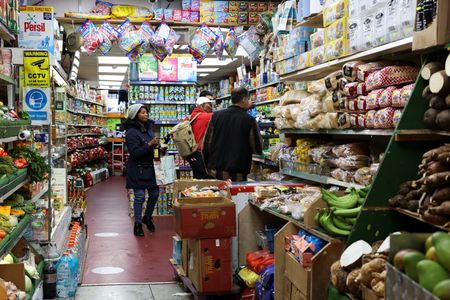By James Davey
LONDON (Reuters) -British grocery price inflation edged higher in March, industry data showed on Tuesday, putting more pressure on consumers’ budgets at a time when they are facing several other cost increases.
Market researcher Kantar said annual grocery price inflation was 3.5% in the four weeks to March 23, versus 3.3% in last month’s report.
UK grocery sales rose 1.8% over the same period year-on-year, the slowest rate of growth since June last year.
That growth implies a drop in sales volumes, once inflation is taken into account.
Kantar said prices were rising fastest in chocolate confectionery, butter and spreads, and chilled smoothies and juices, and were falling fastest in dog and cat food and household paper products.
In addition to rising food prices, Britons’ spending power is under pressure from increased energy and water bills, and higher local taxes.
UK retailers have warned that employer tax rises imposed in the Labour government’s first budget, together with another rise in the national minimum wage and a new packaging levy, will also be inflationary.
Industry researcher the Institute of Grocery Distribution has forecast that food inflation could hit nearly 5% this year.
A separate survey from the British Retail Consortium, also published on Tuesday, showed overall UK shop prices fell by 0.4% in the 12 months to March, while food prices rose 2.4%.
Discounter Lidl was the best performing bricks and mortar supermarket over the 12 weeks to March 23, with sales up 9.1% year-on-year, Kantar said.
It was followed by fellow discounter Aldi, with growth of 5.6%, and market leader Tesco, with growth of 5.4%.
Asda, Britain’s third largest grocer, remained the industry laggard, with a sales fall of 5.6% and a 1.1 percentage points loss of market share over the year.
Last month, Asda launched a major campaign of price cuts to try to regain lost market share, sending shares in Tesco and Sainsbury’s lower.
UK supermarkets’ market share and sales growth (%)
Market share Market % change in
12 wks to share 12 sales
Mar. 23 2025 wks to Mar. (yr-on-yr)
24 2024
Tesco 27.9 27.3 5.4
Sainsbury’s 15.2 15.1 4.1
Asda 12.5 13.6 -5.6
Aldi 11.0 10.7 5.6
Morrisons 8.5 8.7 0.6
Lidl 7.8 7.4 9.1
Co-operative 5.3 5.4 1.0
Waitrose 4.4 4.4 2.7
Iceland 2.2 2.3 1.8
Ocado 2.0 1.9 11.2
Source: Kantar
(Reporting by James Davey. Editing by Paul Sandle and Mark Potter)











